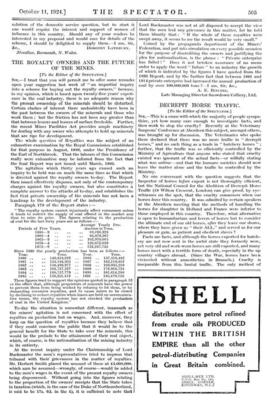THE ROYALTY OWNERS AND THE FUTURE OF THE MINES.
[To the Editor of the SPECTATOR.]
trust that you will permit me to offer some remarks upon your suggestion - last week of "an impartial inquiry into a scheme for buying out the royalty owners," because, in my opinion, which is based upon twenty-five years' experi-
ence in the coal industry, there is no adequate reason why the present ownership of the minerals should be disturbed.
Certain clashes of interest there undoubtedly have been in the past between the owners of the minerals and those who work them ; but the friction has not been any greater than that between lessors and lessees of surface freeholds. Further, the recent Mines Facilities Act provides ample machinery for dealing with any owner who attempts to hold up minerals that are ripe for development.
Thy whole question of Royalties was the subject of an exhaustive examination by- the Royal Commission established for that purpose in August, 1889, under the Presidency of the Earl of Northbrook. That the labours of this Commission really were exhaustive may be inferred from the fact that the final Report was not issued until March, 1893.
The agitation which thirty years ago caused such an inquiry to be held was on much the same lines as that which is directed against the royalty owners to-day. The Report then issued effectively disposes, not only of the contemporary charges against the royalty owners, but also constitutes a complete answer to the attacks of to-day, and establishes the fact that private ownership of the minerals has not been a handicap to the development of the industry. Paragraph 179 of the Report states :—
" The royalty system cannot injuriously affect consumers unless it tends to restrict the supply of coal offered in the market anp thus to raise its price. The figures relating to the production of coal for the last forty years are as follows :-
Periods of Five Years. Average Yearly Pro- duction in Tons.
1885-9 .. .. 66,696,328 1860-4 .. 84,879,267 1865-9 .. 102,970,065 1870-4 .. .. 120,673,039 1875-9 .. .. 133,287,745 Since 1880 the yearly production has been as follows :— Year Tons. Yoar. Tons.
1880 146,818,622 .. 1886 .. 157,518,482 1881 .. 154,184,300 .. 1887 .. 162,119,812 1882 .. .. 156,499,977 .. 1888 .. 169,935,219 1883 163,737,327 .. 1889 .. 176,916,724 1884 .. 160,757,779 .. 1890 .. 181,614,288 1885 .. 159,351,418 .. 1891 .. 185,479,126
Those figures tend to support the opinions quoted in paragraph 53 to the effect that, although proprietors of minerals have the power to prevent thorn from being worked by refusing to let them, or by demanding excessive royalties, and to cause mines to be closed by declining to reduce royalties when leases are held on unremunera- tive terms, the royalty system has not checked the production of coal in the United Kingdom."
To-day the situation is somewhat different, inasmuch as the miners' agitation is not concerned with the effect of royalties on production but on wages. And, moreover, they hart) on the question of royalties because they believe that if they could convince the public that it would be to the general benefit for the State to take over the minerals, this would be the prelude to the attainment of their real object, which, of course, is the nationalization of the mining industry in its entirety.
At the recent inquiry under the Chairmanship of Lord Buckmaster the men's representatives tried to impress that tribunal with their' grievances in the matter of royalties.
Mr. Herbert Smith placed the amount of these at £4,000,000, which sum he assumed—Wrongly, of course—would be added to the men's wages in the event of the present royalty owners being dispossessed. Without going into the figures relating to the proportion of the owners receipts that the State takes
in taxation (which, in the case of the Duke of Northumberland, is said to be 17s. 6c1. in the £), it is sufficient to note that
Lord Buckmaster was not at all disposed to accept the view that the men had any grievance in this matter, for he told them bluntly that : "If the whole of these royalties were swept away, it seems to me the result would be very :mall."
Coined by the propaganda department of the Miners' Federation, and put into circulation on every possible occasion for the purpose of discrediting the owners and justifying the plea for nationalization, is the phrase : "Private enterprise has failed ! " Does it not betoken assurance of no mean order to apply the word " failure " to an industry the growth of which is indicated by the figures I have quoted from the 1893 Report, and by the further fact that between 1891 and 1914 private enterprise had increased the annual production of coal by over 100,000,000 tons ?—I am, Sir, &c,
A. E. RITCHIE,
• Late Managing Director Snowdown Colliery, Ltd.










































 Previous page
Previous page